القائمة الرئيسية

Al-Jaafari: Implementing Annan's Plan Requires Political Will from All Those Who Instigate Violence, Smuggle Weapons and Harbor Terrorists
الخميس, 31 أيار 2012 الساعة 10:00 | , News
 jouhina news,
Syria's Permanent Representative to the UN Bashar al-Jaafari affirmed that implementing the plan of UN Envoy to Syria Kofi Annan requires political will on the part of all those who instigate violence and provide weapons to terrorists, finance and harbor them outside Syria, and not just on the part of the Syrian government.
In a press conference held on Wednesday after a UN Security Council session for discussing the situation in Syria, al-Jaafari said that the first point in Annan's plan discussing ending violence by all sides, which dictates that some sides respect this point, noting that Syria informed the UNSC and the UN Secretary General of the identities of those who are smuggling weapons into Syria.
He stressed that the Syrian government is very serious about implementing Annan's plan, while those who impose second, third or fourth options are the same ones who don't respect the plan and who questioned it from the beginning.
Al-Jaafari said that Annan held positive talks with Syrian officials and reviewed with President Bashar al-Assad the progress made by the government in implementing his plan, with President al-Assad reminding Annan of the need for everyone to commit to the plan and cease weapon smuggling into Syria.
He said that most of the interpositions during the session were balanced and used more accurate terms in discussing the situation in Syria, specifically regarding what happened in al-Houla.
He pointed out that the Syrian government and the Syrian people are in a state of shock because of the horrible crime that took place in al-Houla, stressing that none could be more upset over what happened than the Syrians because the victims – the children, civilians and military personnel – are our own people, noting that 26 soldiers and officers were martyred in this incident.
Al-Jaafari said that this crime is heinous, horrifying and unjustifiable, and that those who committed will be brought to justice in Syria, adding that a committee is in charge of the investigation and is due to finish its work by Thursday or Friday, at which point everyone will know the results of the investigation and the identities of the perpetrators.
"We want the international community to specify those who are working against Annan's plan and those who finance and harbor armed terrorist groups," he added.
He noted that this crime isn't the beginning of the crisis in Syria which dates back to almost a year, saying that some of the representatives at the UNSC showed a high sense of responsibility by acknowledging the existence of a "third element" which is the armed groups, something that Syria had been trying to explain for a year and was met by doubt by these same representatives.
Al-Jaafari went on to explain that the Syrian people are facing terrorist groups that are trained, protected and funded by some Arab and regional countries and other countries from elsewhere in the world, pointing out that Syria referred more than 100 to the UN Secretary General, UNSC members and UN agencies containing the names and identities of terrorists along with details on the dates, types and amount of weapons smuggled into Syria, in addition to a list of over 4,000 violations of Annan's plan by the armed groups that caused hundreds of deaths among Syrian civilians and military personnel.
He also drew attention to the ship which was carrying weapons from Libya to the terrorists and Syria and was captured by the Lebanese authorities, in addition to the arrest of 26 Libyan and Tunisian terrorists in Syria whose confessions were relayed to the UNSC, while other foreign terrorists were killed and their identities were likewise sent to the UNSC.
Al-Jaafari noted that a Syrian Salafi opposition figure spoke live on a Lebanese channel from Jeddah two days ago, assuming responsibility for the abduction of Lebanese citizens in Syria who had come from Turkey, concluding that there's no need for presenting one piece of evidence after the other since everyone now knows that Syria is facing dangerous armed terrorist groups.
He also wondered how the German ambassador was talking about his government's concern over Syrian children in al-Houla while the UNIFIL naval forces permitted the ship carrying weapons from Libya to cross the Lebanese waters.
On ending the missions of Syria's ambassadors and diplomats in some countries, al-Jaafari said that diplomacy is based on dialogue and its task is finding settlements and middle grounds and bridging gaps, and that diplomacy isn't based on sanctions, attacking countries or expelling diplomats.
He said that these irresponsible actions show the true intentions of the capitals in question regarding the Syrian crisis, adding that if they actually wanted to help the Syrian people, then they wouldn’t have imposed sanction on them nor facilitated weapon smuggling, adding that the political solution must come from within Syria itself, and that those betting on second, third or fourth options will fall silent.
On some sides accusations that the Syrian government is responsible for the crime in al-Houla, al-Jaafari said that UN Under-Secretary-General Herve Ladsous didn't accuse the government; rather he voiced suspicions, adding that all such talks is premature as the Syrian committee charged with investigating the incident will report its findings on Thursday or Friday.
He also pointed out that the massacres also affected Teldo and al-Shomariya areas, and that their perpetrators were intentionally trying to start a civil war since there are three different sects living in these villages, which shows that the perpetrators are professional criminals.
Regarding the recent UNSC statement and calls for withdrawing the army, al-Jaafari said that this has already been done, pointing out the paradox as there are those who criticize the Syrian government when it deploys the army and law-enforcement forces to protect people while others criticize it when the government doesn't do that which allows terrorists to murder people, stressing that there are situations when the government needs to deploy law-enforcement forces to protect civilians.
Al-Jaafari called on Arab Gulf countries and other countries who are interested in sparking a civil war in Syria to not bet on the failure of Annan's plan, stressing that Syria acknowledges the presence of a legitimate political opposition which the government invited to dialogue which is part of Annan's plan, yet certain hostile countries or governments repeatedly encouraged armed groups and the opposition outside Syria to not engage in dialogue.
He went on to say that the opposition isn't unified and that there are those who are working around the clock to unify it to extort the Syrian government which is diligently working to end violence, stressing the need to pressure the terrorist groups to cease violence and the need for some Arab and regional countries to stop providing these groups with funds, weapons, political support and media coverage.
Regarding some ambassadors' acknowledgment of the presence of terrorist groups, al-Jaafari said that while some have began to share Syria's approach in this regard, others are acting irresponsibly regarding their peacekeeping tasks, adding that regardless of the claims made by an ambassador, they must – as members of the UNSC – refrain from using the term "regime" and instead say "government" if they wish to be responsible and noble-minded.
He stressed that the ambassadors who speak of "options" are after escalation and that they violate Annan's plan, adding that their abandonment of the plan shows that they had been betting on its failure since the beginning.
Al-Jaafari affirmed that the success of Annan's plan requires equal commitment from all sides, ceasing to traffic in Syrian blood, and sending a clear message from the international community on the need to resolve the crisis through the plan and achieve appeasement, not escalation.
He stressed that the diplomats in the UNSC are there to bridge gaps and find acceptable solutions and settlements, not legalize more sanctions and adopt anti-diplomatic measures.
"If they really want to help Syrians, then the messages Syria needs is stopping escalation and speaking wisely about how to help the government to sit with the opposition and engage in comprehensive national dialogue and find a settlement led by Syria," al-Jaafari said, adding that these aren't his own terms, but rather the language of Annan who spoke of a political process led by the Syrian government.
On the appointment of Jeffrey Feltman in a prestigious position in the UN, al-Jaafari said that he hasn't received official word on this, noting that if it were true, then it's a sign of escalation, stressing that the task of the UN is to carry out the international agenda, not force an agenda on the international community, which is why honest and neutral experts are needed for high-ranking posts.
Regarding dialogue and the possibility of holding it outside Damascus, al-Jaafari said that the government accepted China's suggestion to host talks in Beijing, but the opposition, prompted by external instigation, rejected, and that this was repeated when Russia offered to host talks in Moscow, concluding that "the ball isn't in our court; it's in the others' court."
jouhina news,
Syria's Permanent Representative to the UN Bashar al-Jaafari affirmed that implementing the plan of UN Envoy to Syria Kofi Annan requires political will on the part of all those who instigate violence and provide weapons to terrorists, finance and harbor them outside Syria, and not just on the part of the Syrian government.
In a press conference held on Wednesday after a UN Security Council session for discussing the situation in Syria, al-Jaafari said that the first point in Annan's plan discussing ending violence by all sides, which dictates that some sides respect this point, noting that Syria informed the UNSC and the UN Secretary General of the identities of those who are smuggling weapons into Syria.
He stressed that the Syrian government is very serious about implementing Annan's plan, while those who impose second, third or fourth options are the same ones who don't respect the plan and who questioned it from the beginning.
Al-Jaafari said that Annan held positive talks with Syrian officials and reviewed with President Bashar al-Assad the progress made by the government in implementing his plan, with President al-Assad reminding Annan of the need for everyone to commit to the plan and cease weapon smuggling into Syria.
He said that most of the interpositions during the session were balanced and used more accurate terms in discussing the situation in Syria, specifically regarding what happened in al-Houla.
He pointed out that the Syrian government and the Syrian people are in a state of shock because of the horrible crime that took place in al-Houla, stressing that none could be more upset over what happened than the Syrians because the victims – the children, civilians and military personnel – are our own people, noting that 26 soldiers and officers were martyred in this incident.
Al-Jaafari said that this crime is heinous, horrifying and unjustifiable, and that those who committed will be brought to justice in Syria, adding that a committee is in charge of the investigation and is due to finish its work by Thursday or Friday, at which point everyone will know the results of the investigation and the identities of the perpetrators.
"We want the international community to specify those who are working against Annan's plan and those who finance and harbor armed terrorist groups," he added.
He noted that this crime isn't the beginning of the crisis in Syria which dates back to almost a year, saying that some of the representatives at the UNSC showed a high sense of responsibility by acknowledging the existence of a "third element" which is the armed groups, something that Syria had been trying to explain for a year and was met by doubt by these same representatives.
Al-Jaafari went on to explain that the Syrian people are facing terrorist groups that are trained, protected and funded by some Arab and regional countries and other countries from elsewhere in the world, pointing out that Syria referred more than 100 to the UN Secretary General, UNSC members and UN agencies containing the names and identities of terrorists along with details on the dates, types and amount of weapons smuggled into Syria, in addition to a list of over 4,000 violations of Annan's plan by the armed groups that caused hundreds of deaths among Syrian civilians and military personnel.
He also drew attention to the ship which was carrying weapons from Libya to the terrorists and Syria and was captured by the Lebanese authorities, in addition to the arrest of 26 Libyan and Tunisian terrorists in Syria whose confessions were relayed to the UNSC, while other foreign terrorists were killed and their identities were likewise sent to the UNSC.
Al-Jaafari noted that a Syrian Salafi opposition figure spoke live on a Lebanese channel from Jeddah two days ago, assuming responsibility for the abduction of Lebanese citizens in Syria who had come from Turkey, concluding that there's no need for presenting one piece of evidence after the other since everyone now knows that Syria is facing dangerous armed terrorist groups.
He also wondered how the German ambassador was talking about his government's concern over Syrian children in al-Houla while the UNIFIL naval forces permitted the ship carrying weapons from Libya to cross the Lebanese waters.
On ending the missions of Syria's ambassadors and diplomats in some countries, al-Jaafari said that diplomacy is based on dialogue and its task is finding settlements and middle grounds and bridging gaps, and that diplomacy isn't based on sanctions, attacking countries or expelling diplomats.
He said that these irresponsible actions show the true intentions of the capitals in question regarding the Syrian crisis, adding that if they actually wanted to help the Syrian people, then they wouldn’t have imposed sanction on them nor facilitated weapon smuggling, adding that the political solution must come from within Syria itself, and that those betting on second, third or fourth options will fall silent.
On some sides accusations that the Syrian government is responsible for the crime in al-Houla, al-Jaafari said that UN Under-Secretary-General Herve Ladsous didn't accuse the government; rather he voiced suspicions, adding that all such talks is premature as the Syrian committee charged with investigating the incident will report its findings on Thursday or Friday.
He also pointed out that the massacres also affected Teldo and al-Shomariya areas, and that their perpetrators were intentionally trying to start a civil war since there are three different sects living in these villages, which shows that the perpetrators are professional criminals.
Regarding the recent UNSC statement and calls for withdrawing the army, al-Jaafari said that this has already been done, pointing out the paradox as there are those who criticize the Syrian government when it deploys the army and law-enforcement forces to protect people while others criticize it when the government doesn't do that which allows terrorists to murder people, stressing that there are situations when the government needs to deploy law-enforcement forces to protect civilians.
Al-Jaafari called on Arab Gulf countries and other countries who are interested in sparking a civil war in Syria to not bet on the failure of Annan's plan, stressing that Syria acknowledges the presence of a legitimate political opposition which the government invited to dialogue which is part of Annan's plan, yet certain hostile countries or governments repeatedly encouraged armed groups and the opposition outside Syria to not engage in dialogue.
He went on to say that the opposition isn't unified and that there are those who are working around the clock to unify it to extort the Syrian government which is diligently working to end violence, stressing the need to pressure the terrorist groups to cease violence and the need for some Arab and regional countries to stop providing these groups with funds, weapons, political support and media coverage.
Regarding some ambassadors' acknowledgment of the presence of terrorist groups, al-Jaafari said that while some have began to share Syria's approach in this regard, others are acting irresponsibly regarding their peacekeeping tasks, adding that regardless of the claims made by an ambassador, they must – as members of the UNSC – refrain from using the term "regime" and instead say "government" if they wish to be responsible and noble-minded.
He stressed that the ambassadors who speak of "options" are after escalation and that they violate Annan's plan, adding that their abandonment of the plan shows that they had been betting on its failure since the beginning.
Al-Jaafari affirmed that the success of Annan's plan requires equal commitment from all sides, ceasing to traffic in Syrian blood, and sending a clear message from the international community on the need to resolve the crisis through the plan and achieve appeasement, not escalation.
He stressed that the diplomats in the UNSC are there to bridge gaps and find acceptable solutions and settlements, not legalize more sanctions and adopt anti-diplomatic measures.
"If they really want to help Syrians, then the messages Syria needs is stopping escalation and speaking wisely about how to help the government to sit with the opposition and engage in comprehensive national dialogue and find a settlement led by Syria," al-Jaafari said, adding that these aren't his own terms, but rather the language of Annan who spoke of a political process led by the Syrian government.
On the appointment of Jeffrey Feltman in a prestigious position in the UN, al-Jaafari said that he hasn't received official word on this, noting that if it were true, then it's a sign of escalation, stressing that the task of the UN is to carry out the international agenda, not force an agenda on the international community, which is why honest and neutral experts are needed for high-ranking posts.
Regarding dialogue and the possibility of holding it outside Damascus, al-Jaafari said that the government accepted China's suggestion to host talks in Beijing, but the opposition, prompted by external instigation, rejected, and that this was repeated when Russia offered to host talks in Moscow, concluding that "the ball isn't in our court; it's in the others' court."
اقرأ المزيد...

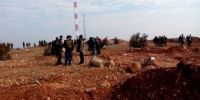 Media delegation visits western countryside of Aleppo
Media delegation visits western countryside of Aleppo 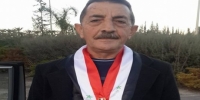 Syrian detainee Majed Farhan al-Shaer free after five and a half year detention in Israeli jails
Syrian detainee Majed Farhan al-Shaer free after five and a half year detention in Israeli jails 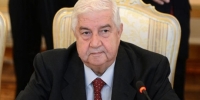 Al-Moallem: Terrorism has spread to the states that have been supporting it for five years
Al-Moallem: Terrorism has spread to the states that have been supporting it for five years 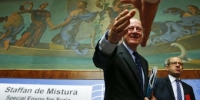 Tripartite meeting on the crisis in Syria held in Geneva
Tripartite meeting on the crisis in Syria held in Geneva 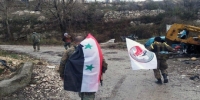 Syrian Army establishes control over four villages near Salma in Lattakia and another in Aleppo
Syrian Army establishes control over four villages near Salma in Lattakia and another in Aleppo 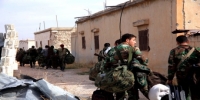 New areas under army control during operation to establish control over Khan al-Assal in Aleppo
New areas under army control during operation to establish control over Khan al-Assal in Aleppo 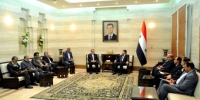 Syria, Iran discuss cooperation in combating drug and human trafficking
Syria, Iran discuss cooperation in combating drug and human trafficking 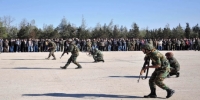 Groups of self-protection squads graduated in Homs and Daraa
Groups of self-protection squads graduated in Homs and Daraa 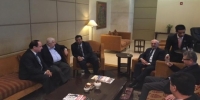 Foreign Minister al-Moallem visits India
Foreign Minister al-Moallem visits India 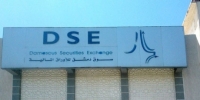 DSE Monday session closes at 1218.12 points
DSE Monday session closes at 1218.12 points 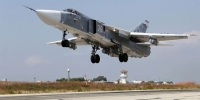 Russian Air Force destroyed around 1,100 terrorist positions in Syria since beginning of 2016
Russian Air Force destroyed around 1,100 terrorist positions in Syria since beginning of 2016 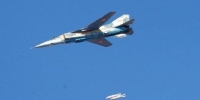 Army establishes control over areas in Lattakia, the Air Force destroys 20 ISIS trucks in Deir Ezzor
Army establishes control over areas in Lattakia, the Air Force destroys 20 ISIS trucks in Deir Ezzor 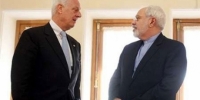 Zarif asserts Iran will not let Saudi actions undermine resolving crisis in Syria
Zarif asserts Iran will not let Saudi actions undermine resolving crisis in Syria  The Syrian starving little “Mona Lisa” turns out to be Lebanese
The Syrian starving little “Mona Lisa” turns out to be Lebanese 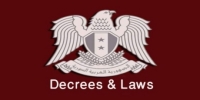 President al-Assad issues law on public-private partnership
President al-Assad issues law on public-private partnership  ترامب: لا استبعد اندلاع حرب مع فنزويلا
ترامب: لا استبعد اندلاع حرب مع فنزويلا
 مصادر تكشف هوية المتهم الرئيسي في شبكة سرقة الآثار من المتحف الوطني
مصادر تكشف هوية المتهم الرئيسي في شبكة سرقة الآثار من المتحف الوطني
 وزارة الدفاع الروسية تعلن تحرير 3 بلدات جديدة في منطقة العملية العسكرية بأوكرانيا
وزارة الدفاع الروسية تعلن تحرير 3 بلدات جديدة في منطقة العملية العسكرية بأوكرانيا
 المرصد السوري: 17 توغّلاً إسرائيلياً في الجنوب السوري خلال أسبوع وسط غياب الموقف الحكومي
المرصد السوري: 17 توغّلاً إسرائيلياً في الجنوب السوري خلال أسبوع وسط غياب الموقف الحكومي
 بوتين يُحذّر من استخدام الأصول الروسية: العواقب قد تكون وخيمة
بوتين يُحذّر من استخدام الأصول الروسية: العواقب قد تكون وخيمة
